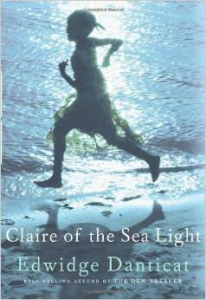Book Review: ‘Claire of the Sea Light’ by Edwidge Danticat
 2/7/15 — REVIEW: EDWIDGE DANTICAT’S CLAIRE OF THE SEA LIGHT
2/7/15 — REVIEW: EDWIDGE DANTICAT’S CLAIRE OF THE SEA LIGHT
I spent a few days in Haiti last week without leaving home. My tour guide was Edwidge Danticat, and the mode of transportation was her magnificent novel, Claire of the Sea Light, which brought Haiti’s sights, sounds, smells to my senses, while introducing me to the people and their incredible courage, perseverance and hope. It was a remarkable journey, one I won’t forget for quite a while.
The novel is set in an impoverished fishing village of only 11,000 people, though dead ancestors and returning émigrés are ever present. The eight chapters in this deceptively slim volume can easily stand on their own (two were published as short stories in The New Yorker), but they are far more effective in concert, building on one another to enrich a reader’s understanding of the community and the individuals who inhabit it, however much they have tried to leave. While different chapters feature different protagonists, their lives are intertwined in real and spiritual ways. The effect on the reader is to make us realize that we are all connected, all in some way the same, no matter how different we are in other ways.
The novel takes on a single day, though flashbacks cover a ten-year period in Haiti’s troubled history. The single day is the seventh birthday of Claire Lymyé Lanmé Faustin and the seventh anniversary of her mother’s death in childbirth.  On each of her birthdays, Claire and her father, Nozias, leave their stark, one-room shack to visit the cemetery, reminding Claire that “her birthday is also a day of death.” Often present on these birthdays is Gaëlle, a wealthy fabric vendor who was Claire’s wet nurse. She, too, is tied to Claire’s birthday because it is also the anniversary of a traffic accident that took the life of her young daughter. Claire’s father, meanwhile, has been trying to persuade Gaëlle to take possession of the girl and give her a better life, at least until he can go off and find a means of providing more substantially for her. To add still another layer to the cycle of life and death, Gaëlle’s husband was shot dead by gang members in Haiti on the day his and Gaëlle’s daughter was born.
On each of her birthdays, Claire and her father, Nozias, leave their stark, one-room shack to visit the cemetery, reminding Claire that “her birthday is also a day of death.” Often present on these birthdays is Gaëlle, a wealthy fabric vendor who was Claire’s wet nurse. She, too, is tied to Claire’s birthday because it is also the anniversary of a traffic accident that took the life of her young daughter. Claire’s father, meanwhile, has been trying to persuade Gaëlle to take possession of the girl and give her a better life, at least until he can go off and find a means of providing more substantially for her. To add still another layer to the cycle of life and death, Gaëlle’s husband was shot dead by gang members in Haiti on the day his and Gaëlle’s daughter was born.
Danticat could easily have shouted this novel, making more of the senseless violence, political corruption, and unspeakable poverty. Instead she whispers, leaving so much unspoken but not unsaid. The novel is filled with unforgettable images that often combine beauty and blight. In a flashback to Gaëlle’s pregnancy, we learn that she had become fascinated with the carcasses of dozens of dead frogs that have exploded due to a period of extreme heat:
“These frogs frightened not just the children who chased them into the rivers and creeks at dusk, or the parents who hastily pried the slimy carcasses from their young ones’ fingers, but also twenty-five-year-old Gaëlle, who was more than six months pregnant and feared that, should the temperature continue to rise, she too might burst. The frogs had been dying for a few weeks, but Gaëlle hadn’t noticed at first. They’d been dying so quietly that for each one that had expired, another had taken its place along the gulch near her house, each one looking exactly the same and fooling her, among others, into thinking that a normal cycle was occurring, that young was replacing old, and life replacing death, sometimes slowly and sometimes quickly. Just as it was for everything else.”
Later, in a truly heartbreaking scene, Gaëlle considers going to bed with the man who accidentally killed her daughter:
“She wondered whether their coming together in this way—to love rather than kill—might resolve everything at last. Might her looking down at his sorrowful face, and his being in her sorrowful bed, help them both take back that moment on the road?”
Danticat’s novel can be appreciated on many levels and is undoubtedly worth reading many times, but what struck me hardest in my first reading was the resilience of the Haitians. They have so little and bear so much pain. Yet somehow they approach each day with hope and look where they can and how they can, not just for survival, although that is always an issue, but also at finding their way to something better, no matter how unlikely the prospects. This novel will stay with me for a long time.
Mark Willen
Mark Willen’s novels, Hawke’s Point, Hawke’s Return, and Hawke’s Discovery, were released by Pen-L Publishing. His short stories have appeared in Corner Club Press, The Rusty Nail. and The Boiler Review. Mark is currently working on his second novel, a thriller set in a fictional town in central Maryland. Mark also writes a blog on practical, everyday ethics, Talking Ethics.com.
- Web |
- More Posts(48)